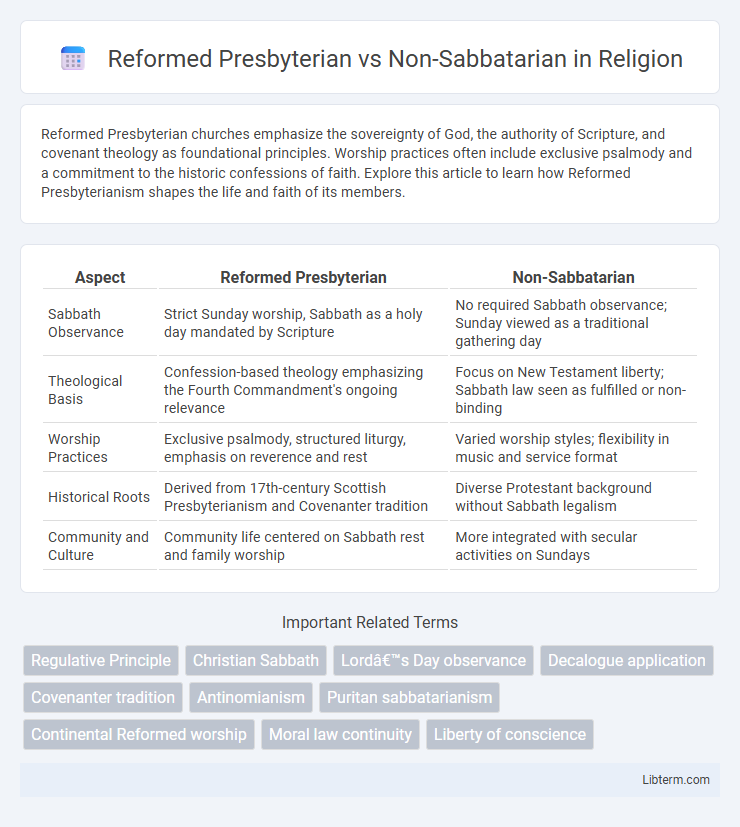Reformed Presbyterian churches emphasize the sovereignty of God, the authority of Scripture, and covenant theology as foundational principles. Worship practices often include exclusive psalmody and a commitment to the historic confessions of faith. Explore this article to learn how Reformed Presbyterianism shapes the life and faith of its members.
Table of Comparison
| Aspect | Reformed Presbyterian | Non-Sabbatarian |
|---|---|---|
| Sabbath Observance | Strict Sunday worship, Sabbath as a holy day mandated by Scripture | No required Sabbath observance; Sunday viewed as a traditional gathering day |
| Theological Basis | Confession-based theology emphasizing the Fourth Commandment's ongoing relevance | Focus on New Testament liberty; Sabbath law seen as fulfilled or non-binding |
| Worship Practices | Exclusive psalmody, structured liturgy, emphasis on reverence and rest | Varied worship styles; flexibility in music and service format |
| Historical Roots | Derived from 17th-century Scottish Presbyterianism and Covenanter tradition | Diverse Protestant background without Sabbath legalism |
| Community and Culture | Community life centered on Sabbath rest and family worship | More integrated with secular activities on Sundays |
Introduction to Reformed Presbyterianism
Reformed Presbyterianism is a branch of Protestant Christianity grounded in the principles of the Reformation, emphasizing covenant theology, the sovereignty of God, and adherence to the Westminster Confession of Faith. It distinguishes itself from non-Sabbatarian traditions by observing the Sabbath strictly as a day of rest and worship, reflecting the fourth commandment's enduring moral obligation. This denomination upholds Presbyterian church government with elders leading congregations, contrasting with less structured, non-Sabbatarian groups that may not prioritize Sabbath observance or Reformed doctrinal standards.
Understanding Non-Sabbatarian Beliefs
Non-Sabbatarian beliefs reject the strict observance of Sabbath rest on Sunday, emphasizing Christian freedom and continuous worship throughout the week rather than a designated holy day. Unlike Reformed Presbyterian traditions, which uphold Sabbath observance as a covenantal sign and moral law, Non-Sabbatarians view the Sabbath command as fulfilled in Christ and not binding under the New Covenant. This perspective encourages believers to honor God through everyday living rather than mandated rest, reflecting a theology centered on grace and spiritual liberty.
Historical Background and Development
Reformed Presbyterianism traces its origins to the 17th-century Scottish Covenanters, emphasizing strict Sabbath observance based on biblical Sabbath theology. Non-Sabbatarian groups, emerging concurrently in diverse Christian traditions, reject the binding nature of Sabbath laws, interpreting the Sabbath as fulfilled in Christ and not requiring strict weekly observance. The development of Reformed Presbyterianism involved codifying Sabbath practices within confessional standards like the Westminster Confession, whereas Non-Sabbatarian thought evolved through varied theological interpretations emphasizing Christian liberty and the Lord's Day.
Core Doctrinal Distinctions
Reformed Presbyterians uphold the observance of the Sabbath on Sunday as a perpetual moral command rooted in the Fourth Commandment, emphasizing rest and worship aligned with covenant theology. Non-Sabbatarians reject mandatory Sabbath observance, viewing the Sabbath law as fulfilled in Christ and not binding under the New Covenant. This doctrinal divergence reflects deeper theological differences in covenant continuity, law, and Christian liberty within Reformed traditions.
Sabbath Observance in Reformed Presbyterianism
Reformed Presbyterianism strictly upholds Sabbath observance as a biblical command, emphasizing complete rest and worship from sunset Friday to sunset Saturday or Sunday, depending on tradition. This covenantal approach views the Sabbath as a perpetual moral law, integral to God's covenant with His people, requiring cessation from secular work and dedicating the day to spiritual renewal. In contrast, non-Sabbatarian Christians generally regard the Sabbath as fulfilled in Christ, often observing Sunday worship without strict rest mandates, reflecting a more flexible stance on Sabbath practices.
The Non-Sabbatarian Perspective on the Lord’s Day
The non-Sabbatarian perspective on the Lord's Day emphasizes Christian freedom from strict Sabbath observance, viewing Sunday primarily as a symbolic day of worship and rest rather than a literal continuation of the Old Testament Sabbath. Non-Sabbatarians often highlight the resurrection of Christ as the foundation for worshiping on the first day of the week, rejecting the legalistic application of Sabbath laws. This approach prioritizes spiritual rest and communal worship without mandating total cessation from work or secular activities on Sunday.
Scriptural Interpretations: Sabbath and Sunday Worship
Reformed Presbyterian theology holds a strict Sabbath observance based on the Fourth Commandment, emphasizing Sunday as the Christian Sabbath, rooted in Exodus 20:8-11 and reinforced by Christ's resurrection in Acts 20:7. Non-Sabbatarian churches interpret the New Testament teachings, particularly Colossians 2:16-17, as releasing believers from the obligatory Sabbath law, viewing Sunday worship as a tradition rather than a command. The debate centers on covenant theology's application of Old Testament Sabbath laws versus the New Testament liberty and Christian freedom from ceremonial observance.
Worship Practices and Church Life Compared
Reformed Presbyterian worship practices emphasize strict Sabbath observance, including exclusive psalmody and regulated liturgy, reflecting a covenantal theology that honors the fourth commandment. Non-Sabbatarian churches exhibit greater flexibility in worship styles, incorporating contemporary music, varied liturgical elements, and less rigid Sabbath restrictions. Church life in Reformed Presbyterian congregations often prioritizes doctrinal conformity and communal covenant renewal, contrasting with the more diverse and adaptable approaches found in Non-Sabbatarian communities.
Theological Implications for Christian Living
Reformed Presbyterian theology emphasizes Sabbath observance as a divine command rooted in the Fourth Commandment, promoting rest, worship, and spiritual renewal aligned with covenantal faithfulness. Non-Sabbatarian perspectives advocate Christian liberty in Sabbath observance, prioritizing grace and personal conviction over strict legalistic adherence. This theological divergence influences Christian living by shaping worship practices, ethical frameworks, and community rhythms of holiness and rest.
Conclusion: Navigating Differences in Modern Christianity
Reformed Presbyterian theology emphasizes Sabbath observance as a covenantal sign, promoting strict rest and worship on the seventh day, whereas Non-Sabbatarian perspectives often view Sabbath principles as fulfilled in Christ, allowing flexible worship practices throughout the week. Understanding these distinctions aids believers in navigating theological diversity with respect and clarity, fostering unity without compromising core doctrinal convictions. Engaging in informed dialogue about Sabbath theology enriches modern Christianity by embracing historical roots while addressing contemporary spiritual needs.
Reformed Presbyterian Infographic

 libterm.com
libterm.com